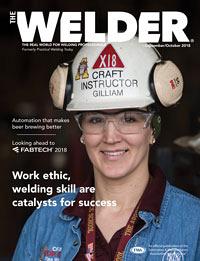- FMA
- The Fabricator
- FABTECH
- Canadian Metalworking
Categories
- Additive Manufacturing
- Aluminum Welding
- Arc Welding
- Assembly and Joining
- Automation and Robotics
- Bending and Forming
- Consumables
- Cutting and Weld Prep
- Electric Vehicles
- En Español
- Finishing
- Hydroforming
- Laser Cutting
- Laser Welding
- Machining
- Manufacturing Software
- Materials Handling
- Metals/Materials
- Oxyfuel Cutting
- Plasma Cutting
- Power Tools
- Punching and Other Holemaking
- Roll Forming
- Safety
- Sawing
- Shearing
- Shop Management
- Testing and Measuring
- Tube and Pipe Fabrication
- Tube and Pipe Production
- Waterjet Cutting
Industry Directory
Webcasts
Podcasts
FAB 40
Advertise
Subscribe
Account Login
Search
Work ethic, welding skill serve as catalysts for success
Kelli Gilliam’s tangled path to becoming the first female craft instructor for welding at Huntington Ingalls’ Newport News Shipbuilding Apprentice School
- By Amanda Carlson
- September 19, 2017
- Article
- Arc Welding
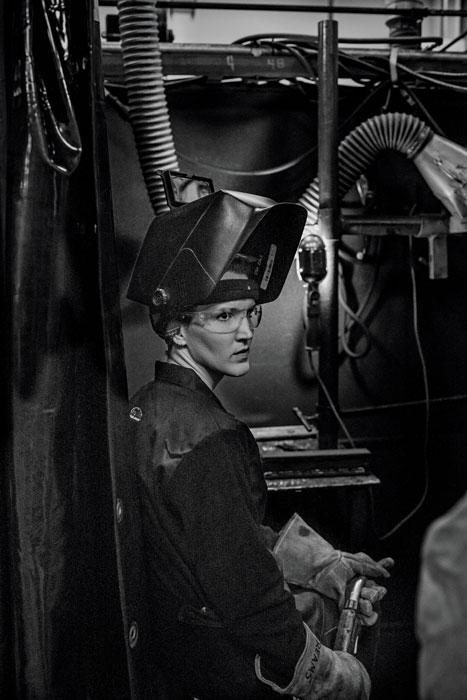
Even though she is young in age, Gilliam has the perspective of someone who has lived a lot longer. “Everyone says hindsight is 20/20, and because of that I feel the need to tell not just my children but other kids to be mindful of their strengths and don’t get stuck on the big picture.” Photo courtesy of Melissa Helmick, The Photographic Storyteller, Newport News, Va.
Kelli Gilliam is a dynamo. The 30-year-old is a wife, a mother of five, a Navy veteran, a foreman at Huntington Ingalls Shipbuilding in Newport News, Va., a craft instructor at the shipyard’s prestigious Apprentice School, and the reigning Mrs. Denbigh—a title that feeds into the Mrs. Virginia America and, eventually, Mrs. America pageants. While life isn’t easy with all of that going on, it certainly is good.
It hasn’t always been that way.
At age 30, Gilliam is still very young. But considering all of the life she has squeezed into those 30 years, the product is a perspective, appreciation, and maturity of someone twice her age. She has endured a lifetime of hardships: motherhood at a young age, a broken marriage, homelessness, and the fear and uncertainty that accompany those things along with the weight of providing for her children.
Two things propelled her through those difficult years—work ethic and welding. Gilliam’s work ethic was ingrained in her by her parents at a very young age. And the welding? Well, that was something her father introduced her to when she was a little older. Fortunately, it continued to present itself in the moments when Gilliam needed it the most.
Welding helped limit the amount of time she and her two children lived in a shelter. It also served as a springboard to get hired at the shipyard, where she caught the eye of a welding instructor who encouraged her to apply to the Apprentice School. From there came the opportunities to learn as an apprentice and earn a degree—all while getting paid—apply for a leadership position at the shipyard, and ultimately become the first female craft instructor for welding at the Apprentice School.
Most importantly to Gilliam, she realized that welding was her passion, which is why she’s been able to accomplish all that she has.
Not one to rest on her laurels, Gilliam is now using her platform as a craft instructor and as Mrs. Denbigh to share her story with others, encourage young people to identify their strengths and find their own passions, and to advocate for manufacturing to her community and beyond.
TW: How did you start welding in the first place?
When I was in high school my dad got laid off from his job, so he went to welding school and took classes during the week and on Saturdays. On Saturdays he would ask my brothers and I to come to class with him. He said he didn’t care what we did while we were there, he just didn’t want us sitting at home.
I’d sit in the classroom looking at the books, but eventually I remember being in the shop and having the instructor show me how to run a bead. From that point on I’d just sit at the table all day running beads. I liked watching the instructor weld, and I liked when they took the test plates and bent them to see if they were going to crack. It just intrigued me.
For me, welding was really cool because I felt like I was focused and that I was making something all at the same time, even though I wasn’t making anything at all.
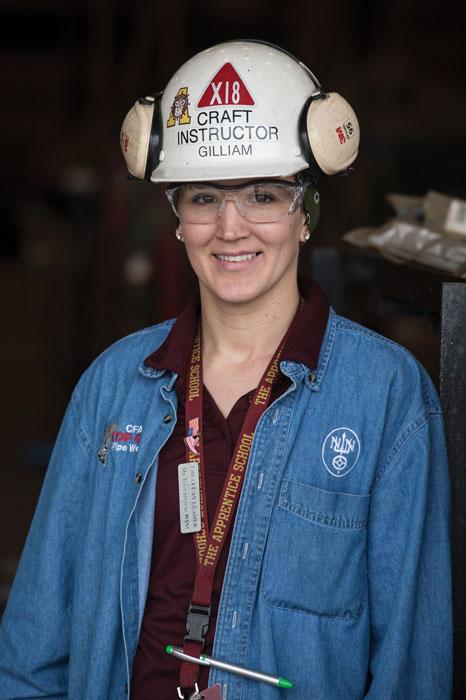
Kelli Gilliam, 30, became the first female craft instructor for welding at the Apprentice School at Huntington Ingalls Shipbuilding in Newport News, Va. Photo courtesy of Huntington Ingalls.
TW: Did you know immediately that welding was something you wanted to do, or did that happen later?
It happened much later. At the time, I didn’t really pay a lot of mind to welding. The last semester of my senior year I only had two classes—one of them was band and the other was a math class. Outside of those two classes I worked three jobs, and none of them had anything to do with welding. I worked a breakfast shift at a diner from 5 a.m. to 11 a.m. I’d leave that and go to school for my two classes, and then I’d finish class and go straight back to work until about 11 p.m., either at Pizza Hut or Texas Roadhouse.
When I decided to go into the Navy, none of the of jobs they listed sounded right for me. I asked if there was anything else I could do, and the recruiter started naming off some things. When he came to steelworker, I said, “What’s that?” He said they work with metal and they weld, and I said, “I’ll take it!”
The Navy is where I really got my hands-on welding training. I had to take an actual class, I had to learn the book work, I had to do a plate test, and it was through all of that where I realized I could actually do it very well. I graduated at the top of my class.
Once I got married I had to put it on the back burner. When it comes to the house/home life, you have to decide what is important. My husband at the time was active duty and I had one little boy with another one on the way. So, I stayed home and did my reserve weekend while he worked full time.
I never thought much about doing welding full time until it was time to leave the marriage. I was fleeing a very rough situation. When I arrived at the shelter with my children, one of the ladies there told me I should write a resumé so I could get a job. I told her that I knew how to wait tables and I knew how to weld. And she said, “Well, let’s do the welding!”
The shipyard was the first company I reached out to that called me back, and that was all she wrote after that.
TW: Have you ever reflected on the times
welding presented itself to you when you needed it the most? The fact that my dad had me go with him to his class all those years ago, that was the moment where welding became a tool in my toolbelt. And it really saved me. I never knew the magnitude of that one small decision until now. Everyone says hindsight is 20/20, and because of that I feel the need to tell not just my children but other kids to be mindful of their strengths and don’t get stuck on the big picture.Growing up, I was a really good trumpet player, but I wasn’t quite good enough to become a professional trumpet player. Some people get beat up by that failure. I’ve learned that there are similarities between my ability to weld and my talent as a musician. Playing an instrument is really the reason why I can melt the metal and pay attention to everything that is happening.
TW: How did you go from working as a welder at the shipyard to being accepted into the prestigious Apprentice School?
The Apprentice School opportunity came to me while I was at the shipyard welding school, which are two different things that reside under the same umbrella.
The apprentice program only admits a certain number of people. While welders work in different areas of the yard, apprentices are guaranteed to rotate throughout the whole two-and-a-half-mile shipyard during the four-year training. Rotating gives apprentices experience in everything, which helps them to be more well-rounded. Apprentices also are expected to be leaders on the yard and to understand all aspects of what we do.
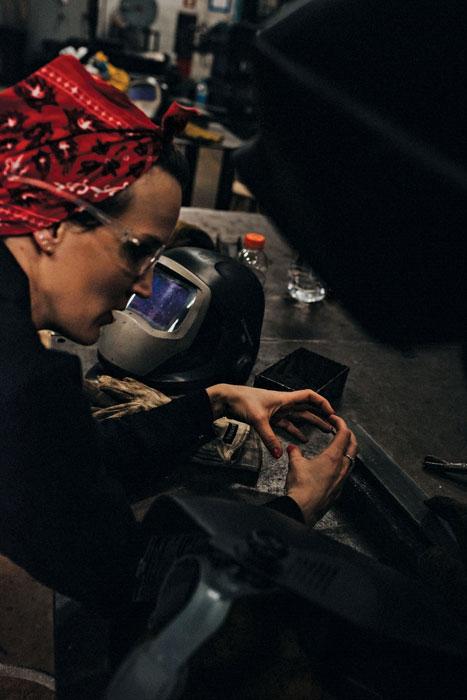
Gilliam’s passion for welding has carried her through some pretty difficult moments in her life. She now shares the importance of finding one’s passion with others. Photo courtesy of Melissa Helmick, The Photographic Storyteller, Newport News, Va.
My former weld instructor recognized that I am someone who works very hard, and I was raised to trust that what I’m being told to do will help me get better. I just knew I needed to trust him because I needed a job; not just to take care of my kids, I knew it was the right thing to do.
He asked me one day if I wanted to go back to school and I said yeah, of course. But I had two kids at home and there was no way for me to take them somewhere after work so that I could go to school. That’s when he told me about the Apprentice School—I didn’t even know what it was. That week someone from the Apprentice School came and talked to me at work, and that was all she wrote.
I applied to the Apprentice School in April of that year, and I actually found out I got accepted while I was on a job in the first shop I ever worked in. Someone came up to me and said, “Don’t you know you’re supposed to be at orientation right now?” I had gotten accepted to the Apprentice School and I didn’t even know it. I didn’t have good Wi-Fi at the time so I didn’t realize I had gotten an email. So I cleaned up and ran over there. It all happened so fast.
While I was in the Apprentice School, I worked my two years as a welder, completed my world-class shipbuilding training, and I chose to do an associate degree in business administration. I spent two days in school and three days welding on the waterfront—all while I was being paid for a 40-hour week.
TW: Explain why graduating from the Apprentice School is a special accomplishment.
Graduating as an apprentice is considered an elite standing in the shipyard. The other great thing about the program is it provided me with the opportunity to earn an associate degree in business administration, which I now have. I am now more prepared to be a leader in my company than I would have been if I had just come in to be a welder.
You can be a normal welder, and there’s nothing wrong with that because that’s how I started with the company. What I liked about the apprentice program is it didn’t take me out of the yard. Instead, I got to rotate working in different shops, which allowed me to gain experience with everything that we do here.
TW: How does it feel to be the first female welding instructor at the Apprentice School?
When I came to the yard, I wasn’t focused on the fact that I was a female in a male-dominated industry. I was just very focused on having a job and taking care of my kids.
I never focused on the “first female” part until I accepted the position. It’s something that has taken center stage recently with articles and interviews. But I don’t want the fact that I’m a female to be the reason I’m chosen for anything. Instead, I want to earn it because I’ve put the work in and have the skills necessary to do that job.
TW: How and why did you get involved in the Mrs. Denbigh pageant?
I went to support a friend who was competing in a pageant to get herself out of the box and build up her confidence. I brought my girls with me and we had a great time.
I saw that the pageant she did wasn’t one of those where you had to have cookie-cutter looks to compete. All of the women on stage had careers, a unique demeanor, and lifestyles that were totally different from one another.
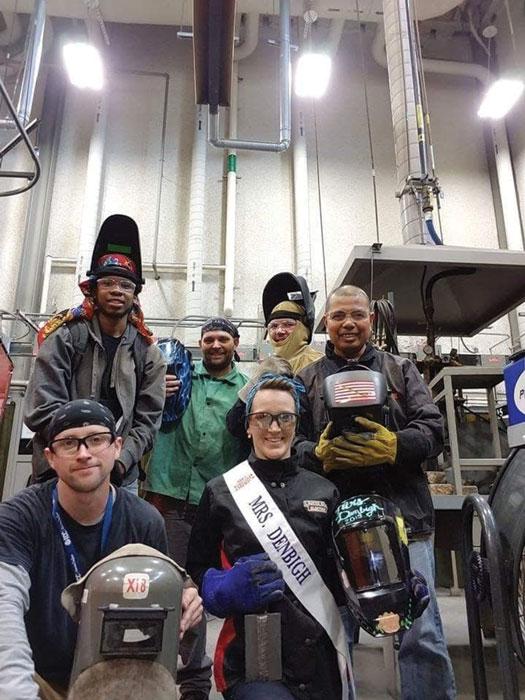
Gilliam uses her platform as the reigning Mrs. Denbigh to create awareness about welding and manufacturing. Photo courtesy of Melissa Helmick, The Photographic Storyteller, Newport News, Va.
When I entered, I wasn’t even that concerned about winning. And now as Mrs. Denbigh I serve the community and get out and talk about manufacturing. To me the title is a network, a platform, and a mouthpiece. I’m excited about going to manufacturing camps and talking to kids.
I like that this allows me to get in front of a different audience and talk about manufacturing. When people read my bio and see that I’m a welder, it really throws them off guard.
At one event someone asked me if it was hard to walk around with a crown on my head, and I said, “No not really. I’m used to wearing a hard hat and a welding shield.” So that started some communication with that person.
TW: It sounds like you really enjoy speaking and advocating for welding and manufacturing. But do you ever miss just being a welder?
I miss it. I realize as I get older and after having kids that since I’m very small framed, trying to be a welder long-term probably wasn’t a good idea for me. And even though I really do love what I’m doing now, anytime I get to put my shield on and weld with the welders makes me miss it.
As a leader, sometimes I have to get down and show these guys what I’m talking about. Sometimes I’ll have to get on the deck plate and help someone with something. I enjoy that a lot.
I would love to buy a welding machine for my home. We are working on building a shed, and I’d like the opportunity to teach my kids how to weld. My oldest is turning 12 this year, so he will put his hands on a welder at some point and we’ll see how that goes. I’d at least like to do with them what my dad did with me and give them this skill to put in their toolbox.
About the Author

Amanda Carlson
2135 Point Blvd
Elgin, IL 60123
815-227-8260
Amanda Carlson was named as the editor for The WELDER in January 2017. She is responsible for coordinating and writing or editing all of the magazine’s editorial content. Before joining The WELDER, Amanda was a news editor for two years, coordinating and editing all product and industry news items for several publications and thefabricator.com.
About the Publication
subscribe now
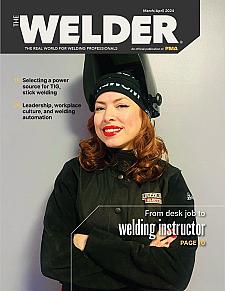
The Welder, formerly known as Practical Welding Today, is a showcase of the real people who make the products we use and work with every day. This magazine has served the welding community in North America well for more than 20 years.
start your free subscription- Stay connected from anywhere

Easily access valuable industry resources now with full access to the digital edition of The Fabricator.

Easily access valuable industry resources now with full access to the digital edition of The Welder.

Easily access valuable industry resources now with full access to the digital edition of The Tube and Pipe Journal.
- Podcasting
- Podcast:
- The Fabricator Podcast
- Published:
- 04/16/2024
- Running Time:
- 63:29
In this episode of The Fabricator Podcast, Caleb Chamberlain, co-founder and CEO of OSH Cut, discusses his company’s...
- Industry Events
16th Annual Safety Conference
- April 30 - May 1, 2024
- Elgin,
Pipe and Tube Conference
- May 21 - 22, 2024
- Omaha, NE
World-Class Roll Forming Workshop
- June 5 - 6, 2024
- Louisville, KY
Advanced Laser Application Workshop
- June 25 - 27, 2024
- Novi, MI
























